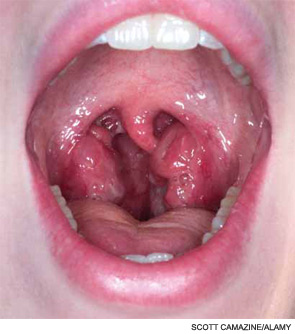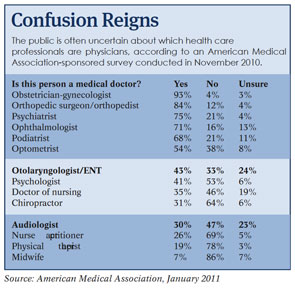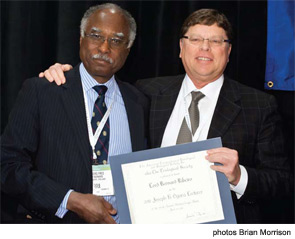Medicare requirements for physician supervision of speech-language pathologists conducting videostroboscopy (CPT 31579) and nasopharyngoscopy (CPT 92511) will move from the strictest level of oversight back to no national supervision level starting in October.

Sleep Studies Clarified: New guidelines amplify the role of PSG for children with sleep-disordered breathing
For otolaryngologists seeing increasing numbers of children with sleep-disordered breathing, whether or not to refer children for a polysomnography (PSG) prior to surgery is not a decision easily made. Currently, only about 10 percent of otolaryngologists request a sleep study in children with sleep-disordered breathing prior to surgery.

Identity Crisis: A new bill would require marketing materials to clarify one’s credentials
More often than not, members of the public are confused about which health care providers are physicians and which are not. That uncertainty is expected to increase as the trend toward non-physician providers earning doctorate degrees continues and as demand for services grows with the millions of people gaining insurance under the 2010 health reform law.
Health Reform Hits Sleep: Speakers encourage specialists to get involved in initiatives
As in all of medicine, the future of sleep medicine will be defined in part by changes evolving under the health care reform law and by the need to slow the unsustainable cost of medical care, experts said here last month at a session at SLEEP 2011, the 25th Annual Meeting of the Associated Professional Sleep Societies,
British Surgeon Describes Lessons Learned from Trainee Duty Hour Limits
Lord Ribeiro gave his presentation at COSM 2011.
TRIO President Discusses the Benefits of U.S. Scientific Research
Dr. Gerald Berke gave his presentation at COSM 2011.

Training Trends: British surgeon offers cautionary tale about limit on trainee duty hours
New limits on doctors in training in the United Kingdom (U.K.) have drastically reduced the amount of training they receive and may put patients in peril, a renowned retired British surgeon told listeners here on April 29 at the Annual Meeting of the Triological Society, held as part of the Combined Otolaryngology Spring Meetings.

Trio Transitions: The outgoing and incoming presidents share their goals for the society
At the Triological Society’s Annual Meeting in April, Robert H. Ossoff, DMD, MD, Maness Professor of Laryngology and Voice and assistant vice-chancellor for compliance and corporate integrity at Vanderbilt University Medical Center in Nashville, will assume the presidency of the society. Dr. Ossoff will be filling the role currently held by Gerald Berke, MD, chief of head and neck surgery at the University of California, Los Angeles.

New Ways to Deliver Care: The Center for Medicare and Medicaid Innovation promises cost-cutting ideas
One of the most common criticisms of the 2010 health care reform law is that it doesn’t do enough to reduce health care costs. Richard Gilfillan, MD, however, begs to differ.

Lessons Learned: How to overcome the cultural barriers to EMR implementation
Health care reform and government incentives have intensified the dialogue on electronic medical records (EMR). Despite the financial incentives for EMR adoption included in the Health Information Technology for Economic and Clinical Health (HITECH) Act, enacted as part of the American Recovery and Reinvestment Act of 2009, physician response remains lukewarm. The HITECH incentives program fails to recognize that the greatest barrier to EMR adoption is not financial, but cultural.
- « Previous Page
- 1
- 2
- 3
- 4
- 5
- 6
- …
- 15
- Next Page »